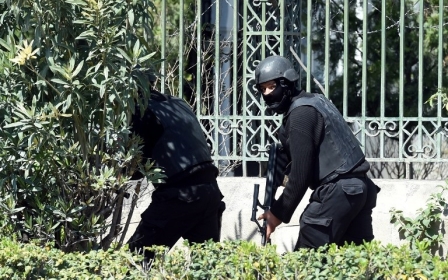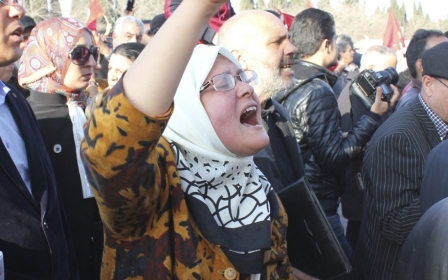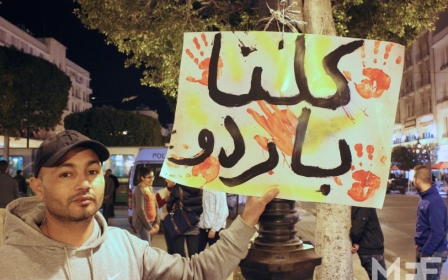Yassine Laabidi: One Tunisian gunman’s path to radicalisation

TUNIS - Al-Falah mosque in Omrane al-Alaa, a middle- to lower-middle class neighbourhood, was full to capacity for midday prayer on Friday. The sermon before the prayer, broadcast from the mosque’s minaret, heavily quoted sayings from the Prophet Mohammed condemning acts of violence against civilians. It was a direct response to Wednesday’s attack at the Bardo Museum in Tunisia’s capital, which resulted in the death of 23 people, including the two gunmen who carried it out.
One of the gunmen, 27-year-old Yassine Laabidi, lived just five minutes from the mosque and regularly attended prayers within its walls. The road leading from the mosque to Laabidi’s house runs along a large open field with an expansive view of the city’s outskirts, set against a backdrop of rolling mountains in the distance. A white mourning tent to receive friends and family giving their condolences, typical in Tunisian tradition, stands outside his family home where he lived with his parents and two siblings, an older brother and younger sister.
While Laabidi’s family said that they were not ready to speak with the media, interviews with a number of Laabidi’s friends, neighbours and acquaintances revealed a familiar portrait of a young man who had his dreams dashed by the hard economic reality in post-revolution Tunisia. Gradually, Laabidi grew more religious and socially reserved as he came under the influence of online, extremist propaganda.
Last December, he travelled to Libya for five weeks under the guise of work, where the government says he trained with a militant cell. For those who knew him, however, his pattern of behaviour did not appear as a clear road map to radicalisation until after Wednesday’s attack.
A resident of Omrane al-Alaa who spoke to Laabidi’s brother Khaled, but asked to remain anonymous, told Middle East Eye that the family was in shock. “He did not imagine his brother would do something like this,” the resident said of Khalid. “He told me that the night before the attack they were sitting and watching TV together.”
Laabidi was average in height and appearance. He was slim with a short, tightly groomed beard and thinning hair and enjoyed swimming. He came from a middle-class family. His father is retired and his mother runs a childcare business from their home. Laabidi himself worked as a courier for a translation agency and delivered files and documents around Tunis, according to people who knew him.
In general, he was a normal person who had once dreamed of travelling abroad to live and work, Nabil Ashori, 37, who owns the barbershop where Laabidi used to get his hair cut, told MEE. But, around the time of Tunisia’s revolution in 2011, he started to change.
It wasn’t the revolution that changed him, said 31-year-old Iqbal Hamdi, a friend of Laabidi’s. Instead, he grew increasingly disillusioned with the social, political and economic landscape in the uncertain years that have followed. In particular, Tunisia has struggled with high levels of youth unemployment, underemployment and marginalisation that a recent report termed a social crisis.
Laabidi’s ambitions were apparently stifled by this difficult reality. “He had a dream like any adolescent, and one day he found out he could not reach his goals,” Hamdi said of Laabidi.
Although he was employed, Laabidi saw that his job could not deliver the future he desired, according to Hamdi. “It was enough money for him to wear clothes, get some food and smoke some cigarettes, but it wasn’t enough to have a family or get married,” he said.
As part of the change, which happened when he was 23 or 24 years old, he became more religious and stopped listening to music. He still treated his friends normally, but his views about politics and society became more extreme, driven by economic frustrations and a sense that the government was not doing anything to help average people, according to Hamdi.
“What he was thinking about, any one of us could be thinking about,” Hamdi said about Laabidi’s frustration with the government and economic situation. “The difference is the reaction.”
Laabidi’s increased religiosity did not stick out in Omrane al-Alaa, where many residents have embraced a more religious lifestyle in recent years. In coffee shop conversations about events in the Syria and Iraq, according to Hamdi, he expressed support for what the militant group Islamic State (IS) was doing, a minority opinion, but one shared by several of his peers.
In retrospect, Laabidi’s behaviour began to appear strange about a year ago. “He completely changed,” his 19-year-old neighbour Omar Souli, who had spoken to Laabidi’s family, told MEE. Already an introvert, Laabidi withdrew even further and stopped greeting his neighbours.
In one incident, Souli’s cousin was talking to his girlfriend while leaning against a wall in front of Laabidi’s house. Laabidi confronted Souli’s cousin, telling him that what he was doing was against religion. “He told him that she’s not your sister, she’s not your mother, she’s not your aunt. So why are you meeting her like that in the street?” Souli said.
Also about a year ago, cars with Libyan license plates began coming to pick Laabidi up from the house. And, in December he told his family that he was going to Libya to work for five weeks, according to Souli. That's the period of time, the government now says, that he was training with a militant group.
“After the events happened, we thought about it and realised it was suspicious,” Souli said, adding that beforehand no one had expected him to do something like this, although authorities said that he was on their radar before the attack.
On Wednesday morning before the attack, Laabidi brought some bread and milk from the market to his house. He then took a bag from inside and told his mother that he was going to the Turkish bathhouse, Souli said.
Instead of going to the bathhouse, he went to the complex in Bardo holding the Tunisian National Museum and parliament and initiated the deadliest attack against civilians in Tunisia’s history.
Resident’s of Omrane al-Alaa are still searching for answers to the question of how a seemingly normal member of their community became a now infamous gunman.
“The internet changed him,” Ashori, the barber, said, adding that he was influenced by extremist websites. “These people take advantage of young people who do not have an idea about religion.”
“This is the result when you don’t have social infrastructure,” 31-year-old Mohamed Ouertani, another resident of Omrane al-Alaa, told MEE. “The only thing the Tunisian citizen is able to do is smoke cigarettes and drink coffee in cafes and smoke marijuana and drink alcohol … There is a percentage of people who are depressed because they have no hope for the future.”
“These people get their ideas from outside. They never get their ideas from the mosque,” said Hamza Baouab, the imam of al-Falah mosque where Yassine use to pray. “I cannot say anything else other than that they are extremists.”
Laabidi’s path to radicalisation, reconstructed in retrospect, looks similar to those of other young men who have carried out attacks around the world. The most difficult questions, about why some young men embrace violence, murder and death while others living in similar social circumstances do not, still remain unanswered.
New MEE newsletter: Jerusalem Dispatch
Sign up to get the latest insights and analysis on Israel-Palestine, alongside Turkey Unpacked and other MEE newsletters
Middle East Eye delivers independent and unrivalled coverage and analysis of the Middle East, North Africa and beyond. To learn more about republishing this content and the associated fees, please fill out this form. More about MEE can be found here.




